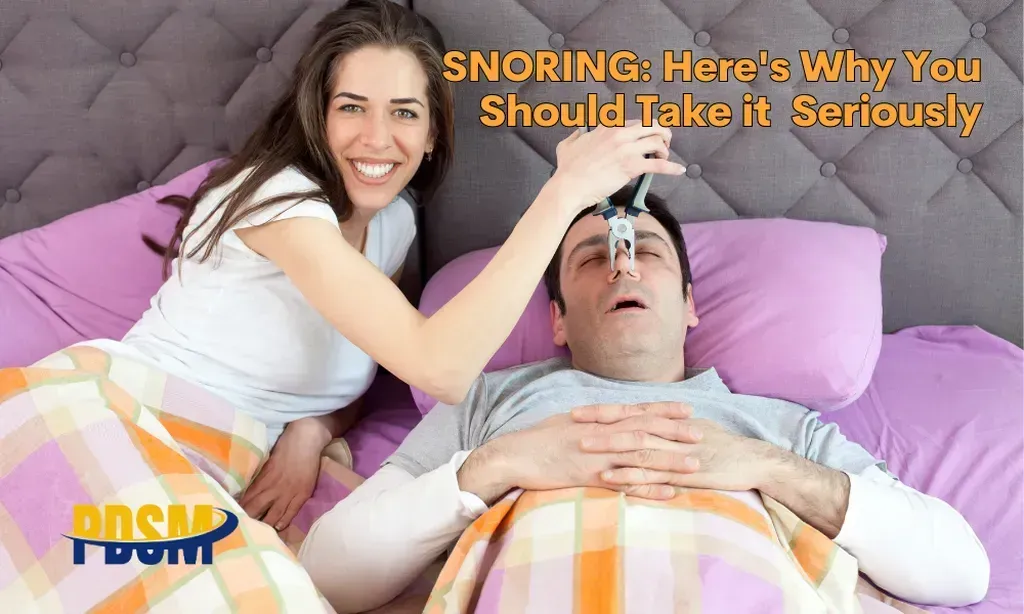Snoring: Here's Why You Should Take it Seriously!

Loud snoring is often treated as something that we find as funny or more of an annoyance, but it can be a symptom of something more serious. Snoring can potentially increase the risk of heart attack, stroke, and other health problems.
Loud snoring is often treated as something that we find as funny or more of an annoyance, but it can be a symptom of something more serious. Snoring can potentially increase the risk of heart attack, stroke, and other health problems.
What Causes Snoring?
Snoring can be caused by many factors, such as the anatomy of your mouth and sinuses, alcohol consumption, allergies, a cold, and your weight. When you doze off and progress from a light sleep to a deep sleep, the muscles in the roof of your mouth (soft palate), tongue, and throat relax. Snoring is quite common and can affect anyone, though it happens more often in men and in people who are overweight.
Occasional snoring isn’t something that you should necessarily be concerned about, but if you’re a long-term snorer, you are likely disrupting a sleep partner and you are definitely at risk of exacerbating health issues due to poor sleep quality. Researchers assert that approximately 90 million Americans snore with 37 million of them doing it regularly.
Snoring can be a symptom of a serious medical condition called sleep apnea. One of the most common reasons for chronic snoring is Obstructive Sleep Apnea. Obstructive sleep apnea is the most common sleep-related breathing disorder. It causes you to repeatedly stop and start breathing while you sleep.
Snoring may be a symptom of sleep apnea
There are several types of sleep apnea, but the most common is obstructive sleep apnea. This type of apnea occurs when your throat muscles intermittently relax and block your airway during sleep. When your airway is blocked your breathing can be paused HUNDREDS of times during the night. That's right -- HUNDREDS! It jolts you awake and can take a serious toll on your emotional and physical health.
While you may not be able to easily identify if you have OSA, a sleep partner is probably quite aware that you are snoring, choking and even gasping for air throughout the night. If you don't have a sleep partner, you might want to record yourself while you are sleeping or check for these signs:
- Snoring
- Excessive daytime sleepiness
- Feeling un-refreshed in the morning
- Morning Headaches
- Stop breathing during sleep
- Choking or gasping during sleep
- Awakening with a dry mouth or sore throat
- Impaired emotional or mental functioning
- Poor concentration and forgetfulness
- Difficulty staying asleep
- Weight gain
- Decreased interest in sex
- Impotence
If you have any of the symptoms associated with sleep apnea, it’s important to speak with your doctor and get screened. If left untreated can have very serious effects on heart health, cognitive health, stroke, diabetes, weight, and other body systems.
HOW IS SLEEP APNEA TREATED?
Your treatment path depends on your overall health and the severity of your sleep apnea. In cases where an underlying medical condition might be to blame, treating that condition is often the first step.
A common breathing therapy treatment that can help resolve issues related to sleep apnea and other breathing conditions is Continuous Positive Airway Pressure ( CPAP ). There are several types of CPAP devices, but all work to direct a flow of air into your airway, helping your body get the oxygen it needs to thrive.
When CPAP is not an option, or you prefer a different approach, doctors that specialize in sleep dentistry, such as Pennsylvania Dental Sleep Medicine, offer oral appliances as an excellent alternative to CPAP. These devices are worn in your mouth while you sleep and help keep your airway open. They are noninvasive and nonintrusive, offering a custom fit, and are comfortable to wear.
HOW CAN AN ORAL APPLIANCE HELP WITH SNORING?
An oral appliance looks a lot like an orthodontic retainer or a sports mouth guard, although the technology behind oral appliances is more advanced. They work by improving your air intake while you sleep and can reduce or even eliminate snoring.
Oral appliances are available from many dental offices, but only sleep dentists trained by the American Academy of Dental Sleep Medicine are certified to treat sleep apnea. The team at Pennsylvania Dental Sleep Medicine recognizes that not everyone has the same set of needs (or the same anatomy) so they offer a range of options to help find the right fit for a patient’s needs.
Most oral appliances fall into one of two categories: mandibular repositioning devices or tongue-retaining devices. A tongue-retaining device works by engaging the tongue and moving it to a more forward position in your mouth during sleep. Mandibular repositioning devices change the position of your jaw during sleep, which helps open your airway.
The experts at Pennsylvania Dental Sleep Medicine help you find the appliance best suited for snoring that is also comfortable and nonintrusive.
You can book an appointment in moments online or by phone at (717) 995-3590 today. Dr. Becky Fox has achieved diplomate status through the American Academy of Dental Sleep Medicine.
Article Resource: https://www.helpguide.org/articles/sleep/sleep-apnea.html https://www.mayoclinic.org/diseases-conditions/obstructive-sleep-apnea/symptoms-causes/syc-20352090


